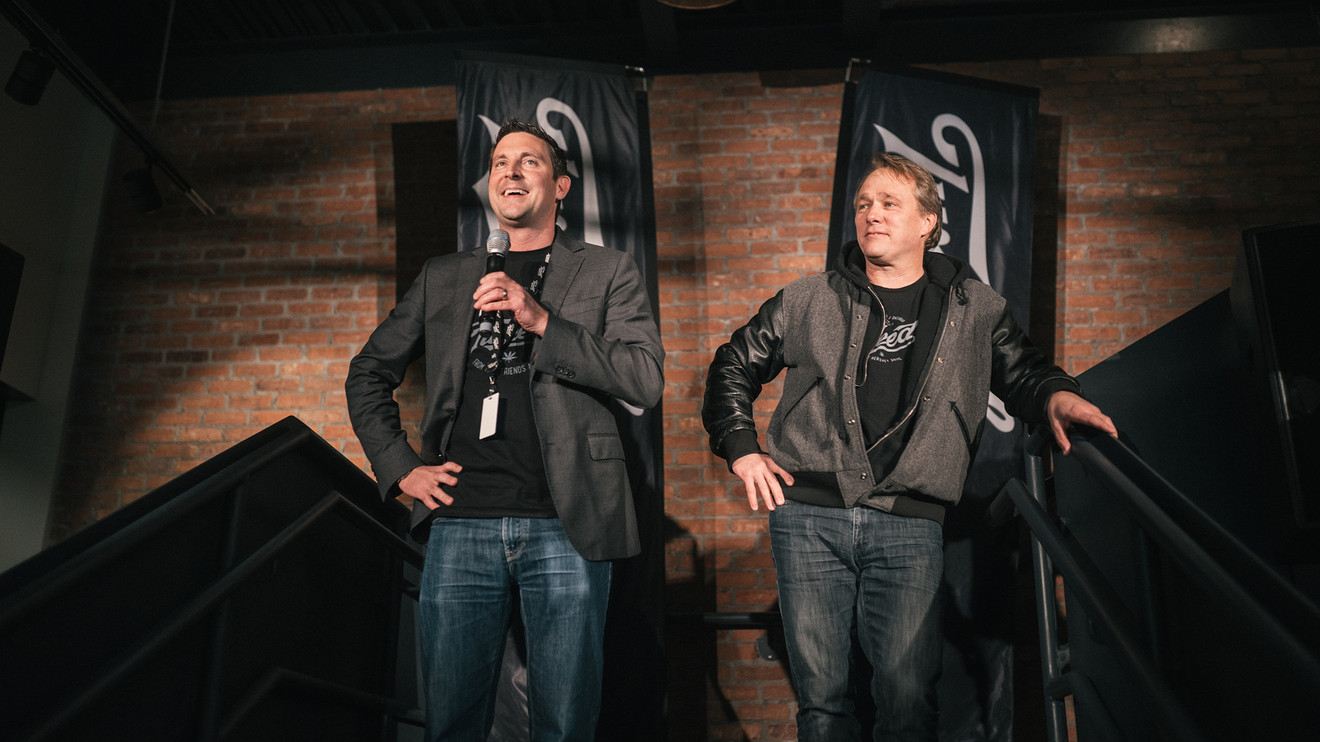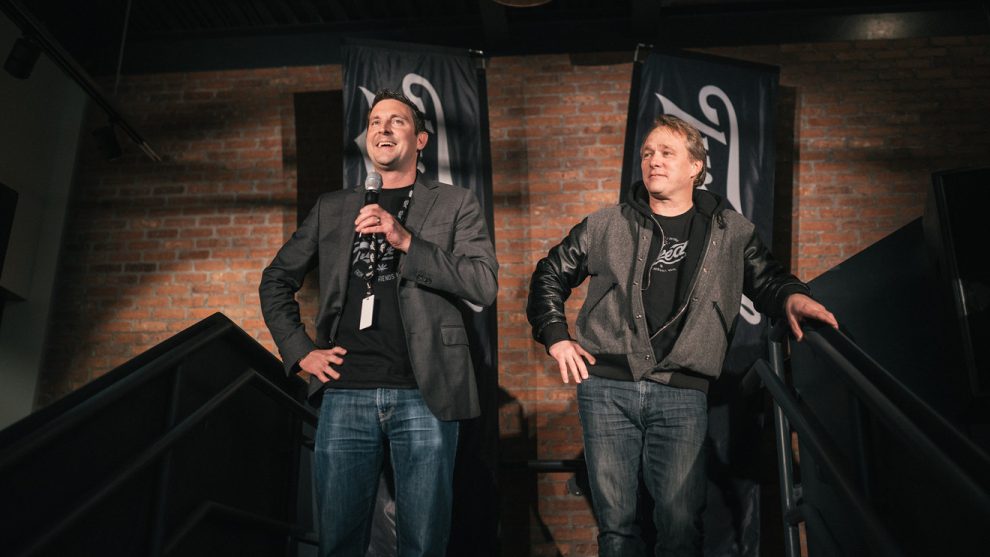
SMITHS FALLS, Ontario — Canopy Growth Corp. co-Chief Executive Bruce Linton rarely declines an opportunity to talk with the news media, often making dozens of appearances in a day.
His co-CEO, Mark Zekulin, is exactly the opposite.
“Somebody has to get all the attention, and somebody has to do all the work,” Zekulin jokes.
Educated at Cambridge University, the one-time political operative in Ontario who was trained as an attorney is charged with running the nuts and bolts of Canopy Growth’s CGC, +3.55% WEED, +3.20% now-sprawling operations. At Canopy Growth’s headquarters in the small town of Smiths Falls, Ontario, MarketWatch sat down with Zeuklin for a wide-ranging interview this week on the company’s work with Constellation Brands Inc. STZ, +0.00% , its priorities for operations and its deal to acquire the right to buy U.S. cannabis operator Acreage Holdings Inc. ACRGF, +1.05% in the future.
This interview has been edited for clarity and length.
MarketWatch: How do you and Bruce Linton divide responsibilities?
Zekulin: I think there’s a high level of “what’s the vision, what’s the strategy,” and I think that’s a joint exercise. Then there’s the outward-facing items, there’s obviously a need to raise a lot of money in the sector and therefore in doing that there’s a need to speak with the media, the stakeholders, the funds and so on. Bruce is taking on a lot of that work.
And in turn, If you look at the organizational chart of Canopy Growth, most of the functions at the company run through me. So that’s the day-to-day of getting licenses here, and that product sold over there, so whatever that is falls to me.
It’s a good divide-and-conquer. We’re frankly very lucky. The sector is moving so fast, there’s so much to do that both of those things are full-time jobs. And we’re fortunate to have a system set up where we can achieve them both.
MW: What are your top three operational objectives for Canopy Growth right now?
Zekulin: One I would call the Canadian established business. In any other sector there are still a thousand variables, but for cannabis, the Canadian structure is as close to an established market as you have. We have a sophisticated operation that is scaling rapidly and that has to work — it is the core of our business and it has to make money, it has to continue to scale, automation has to improve, customers have to get the product they want. It’s a huge undertaking.
Part two is what I’m calling intellectual property and products. In the Canadian context, we have the Oct. 17 launch of edibles and all the new products we can launch and introduce in the world. That’s a huge piece. Just to make the intellectual property to make the right drink, to make the right vape pen — it’s back to that scale of building freight lines that can transport the products and the scale to build them.
One of the other pieces is international expansion. There are markets around the world that are all opening up. They are mostly medical versus recreational. There is building the people infrastructure, the physical infrastructure which have to grow to produce and sell products there.
I think the days where it’s all about the press release about the latest license wherever are over. You know you need a license, that’s the starting point. But that’s sort of table stakes. Right now it’s about, “do you have the teams in the regions, do you have the relationships, do you know what level of GMP certification?”
MW: Many in the sector say your deal with Constellation Brands was a landmark. What are some concrete steps in terms of operations that its expertise has contributed to?
Zekulin: The bottling plant [at our Smiths Falls headquarters], it’s the combination of a couple of worlds coming together. They have built bottling plants, they know how to do that. The teams collectively worked together to estimate demand, we’re building these products, we’re marketing, we’re figuring out whether it should go in a can or a bottle, what the brand name should be and all of that type of stuff.
Ultimately, when that site comes together, it will reflect the knowledge their team has on bottling — we don’t know anything about bottling — but it matched with our intellectual property on cannabis, we do know how to make cannabis drinks. That knowledge is worked into the bottling plant in terms of layers of requirements that Health Canada imposes on any cannabis bottling plant. It’s a great example of two pieces of knowledge that can come together to build the right-size facility in the timeline we need.
MW: How did Constellation help with aspects of selecting Acreage Holdings as an acquisition target?
Zekulin: We certainly draw on resources where it makes sense, but it’s still us, it’s our deal. Constellation has resources to lend to do the analysis faster, so I think that’s just a classic example: They’re a bigger company. They don’t know what we know about cannabis, but they have a more advanced organization structure for obvious reasons.
MW: What is the timeline Canopy Growth is estimating for U.S. federal cannabis legalization?
Zekulin: Our view is that with every day that passes, things keep pointing toward sooner rather than later. That doesn’t mean it will be. It could be a year, it could be three or five years. In our view, it is only going to get closer, and not just because of the passage of time. But, certainly, who knows?
MW: What’s the plan to work with Acreage Holdings prior to federal legalization in the U.S., before the right to buy the company is triggered?
Zekulin: The point of the Acreage deal is that we can help them. Even after the deal closes, they’re their own company and we can’t tell them what to do. But we can do licensing deals. We have great brands that we can make available. We have great intellectual property that underscores those brands. Through that arrangement, there is a good way for us to give them the tools they need to execute our brands and therefore be successful. I think it’s a huge advantage for them if ultimately federal legalization happens sooner than later — we’re giving them the tools to separate themselves from the pack even more in the U.S. Even if it’s six years from now, they will have established themselves that much better in the U.S.
MW: Why opt to list in the U.S. on the New York Stock Exchange with the CGC ticker versus the WEED ticker used in Canada?
Zekulin: You know I love [the ticker] WEED, and I think if all else were equal we would have made it WEED everywhere. But, sometimes you just want to take baby steps. There are a lot of stakeholders involved: your banks, your market makers, the New York Stock Exchange. Overall it felt like folks weren’t ready for that.









